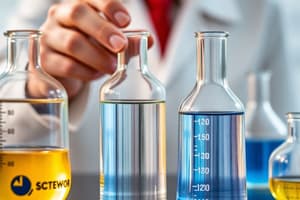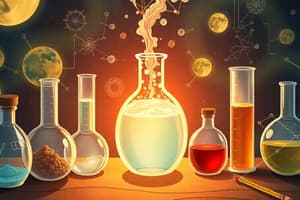Podcast
Questions and Answers
What is the role of the independent variable in an experiment?
What is the role of the independent variable in an experiment?
- It is what you measure in the experiment.
- It is the outcome that is affected by other variables.
- It is what you change in the experiment. (correct)
- It is the variable that remains unchanged.
Which of the following is NOT a step in the scientific method?
Which of the following is NOT a step in the scientific method?
- Collecting data
- Making observations
- Drawing conclusions
- Going on a field trip (correct)
What structure is unique to plant cells?
What structure is unique to plant cells?
- Nucleus
- Cell wall (correct)
- Mitochondria
- Ribosomes
Which energy transformation occurs when a stretched elastic band is released?
Which energy transformation occurs when a stretched elastic band is released?
In which state of matter do particles move freely and are far apart?
In which state of matter do particles move freely and are far apart?
What is the main function of chloroplasts in plant cells?
What is the main function of chloroplasts in plant cells?
What distinguishes a series circuit from a parallel circuit?
What distinguishes a series circuit from a parallel circuit?
What is an example of a unicellular organism?
What is an example of a unicellular organism?
What is the effect of adding more light bulbs in series to a circuit?
What is the effect of adding more light bulbs in series to a circuit?
Which of the following correctly describes a unicellular organism?
Which of the following correctly describes a unicellular organism?
What property is common among elements in the same group of the periodic table?
What property is common among elements in the same group of the periodic table?
Which of the following statements about protons, neutrons, and electrons is true?
Which of the following statements about protons, neutrons, and electrons is true?
What distinguishes a compound from an element?
What distinguishes a compound from an element?
What is the main characteristic of renewable natural resources?
What is the main characteristic of renewable natural resources?
Which phase in the water cycle involves water vapor forming clouds?
Which phase in the water cycle involves water vapor forming clouds?
Which of the following is a characteristic of homogeneous mixtures?
Which of the following is a characteristic of homogeneous mixtures?
Flashcards are hidden until you start studying
Study Notes
I am a Scientist - Scientific Method
- The scientific method involves a systematic approach to investigation, including: making observations, forming a hypothesis, conducting experiments, collecting data, and drawing conclusions.
I am a Scientist - Variables
- Independent variable refers to the factor that is changed or manipulated during an experiment.
- Dependent variable represents the factor that is measured or observed in response to changes in the independent variable.
- Controlled variables are the factors kept constant throughout the experiment to ensure a fair test.
I am a Scientist - Data
- Data collected during experiments can be presented through various visual representations like tables, line graphs, or bar graphs, depending on the data type and the message being conveyed.
I am a Scientist - Safety
- Safety is paramount in scientific experiments, and it involves taking appropriate precautions, such as wearing goggles while using a Bunsen burner and handling chemicals carefully.
Chemistry: States of Matter
- Matter exists in three main states: solid, liquid, and gas.
- Solid: Particles in a solid are tightly packed and arranged in a fixed position, giving solids a definite shape and volume.
- Liquid: Particles in a liquid are close together but can move past each other, allowing liquids to flow and take the shape of their container.
- Gas: Particles in a gas are widely spaced and move freely, enabling gases to expand to fill their container.
Chemistry: States of Matter - Changes of State
- Matter can transition between states through various processes:
- Melting: Solid to liquid
- Freezing: Liquid to solid
- Condensation: Gas to liquid
- Evaporation: Liquid to gas
- Sublimation: Solid directly to gas
- Deposition: Gas directly to solid
Biology: Cells - Cell Structure
- Plant cells possess distinctive features that differentiate them from animal cells:
- Cell wall: Rigid outer layer that provides support and structure.
- Chloroplasts: Organelles responsible for photosynthesis.
- Large vacuole: Central storage compartment for water and other substances.
- Animal cells lack a cell wall and chloroplasts.
Biology: Cells - Energy
- Photosynthesis: Process occurring in chloroplasts of plant cells that converts light energy into chemical energy in the form of glucose and oxygen.
- Cellular respiration: Process taking place in mitochondria of animal cells that releases energy from glucose by converting it into ATP (adenosine triphosphate), the energy currency of cells.
Biology: Cells - Levels of Organisation
- Living organisms exhibit a hierarchical organization:
- Cell: Basic functional unit of life.
- Tissue: Group of similar cells working together to perform a specific function.
- Organ: Structure composed of different tissues that work together to perform a complex function.
- System: Group of organs cooperating for a major body function.
Biology: Cells - Unicellular and Multicellular
- Unicellular organisms: Consisting of a single cell (e.g., bacteria).
- Multicellular organisms: Composed of many cells that specialize in different functions (e.g., humans).
Physics: Energy - Types of Energy
- Kinetic Energy: Energy possessed by an object due to its motion. (e.g., a moving car)
- Potential Energy: Stored energy due to an object's position or state. (e.g., a compressed spring)
- Chemical Energy: Energy stored in chemical bonds of food and fuels.
Physics: Energy - Energy Transformations
- Energy transformations: involve the conversion of one form of energy into another.
- For example, the release of a compressed spring converts elastic potential energy into kinetic energy.
Physics: Energy - Law
- Law of Conservation of Energy: States that energy cannot be created or destroyed, only transferred or transformed from one form to another.
Physics: Energy - Circuits
- Series Circuits: Components are connected in a single loop, resulting in the same current flowing through each component. Total resistance of the circuit increases as more components are added.
- Parallel Circuits: Components are connected in multiple branches, resulting in the same voltage across each branch. Total resistance of the circuit decreases as more branches are added.
Physics: Energy - Circuit Components
- Switch: Controls the flow of electricity in a circuit by opening or closing the circuit path.
- Light Bulb Symbol: A standardized representation of a light bulb used in circuit diagrams.
Physics: Energy - Circuits Effect of Adding Components
- Adding more bulbs in series decreases the brightness of the bulbs due to the increased resistance in the circuit.
Chemistry: Elements and Compounds - Periodic Table
- The periodic table organizes elements based on increasing atomic number.
- Elements with similar properties are grouped vertically, forming groups (e.g., Group 8: Noble Gases).
Chemistry: Elements and Compounds - Atoms
- Atoms are the fundamental building blocks of matter. They are composed of:
- Protons: Positively charged particles located in the nucleus.
- Neutrons: Neutrally charged particles also located in the nucleus.
- Electrons: Negatively charged particles orbiting the nucleus in shells.
Chemistry: Elements and Compounds - Elements
- Elements: Pure substances consisting of only one type of atom. (e.g., Oxygen, O)
Chemistry: Elements and Compounds - Compounds
- Compounds: Substances formed when two or more elements chemically combine in a fixed ratio. (e.g., Water, H₂O)
Chemistry: Elements and Compounds - Mixtures
- Mixtures: Combinations of two or more substances that are not chemically bonded.
- Homogeneous mixtures: Have a uniform composition throughout.
- Heterogeneous mixtures: Have a non-uniform composition, with different components distinguishable.
Earth: Resources - Natural Resources
- Natural Resources: Materials found in nature that are used by humans.
- Renewable resources: Resources that can be replenished over time (e.g., solar energy, wind energy).
- Non-renewable resources: Resources that are finite and cannot be easily replenished at a rate comparable to their consumption (e.g., fossil fuels like coal, oil).
Earth: Resources - Natural Resources
- Renewable Energy: Energy sources that are environmentally friendly and do not produce greenhouse gases. (e.g., solar energy).
Earth: Resources - Water Cycle
- The water cycle is a continuous process of water movement on, above, and below the surface of the Earth:
- Evaporation: Liquid water changes into water vapor.
- Condensation: Water vapor changes back into liquid water, forming clouds.
- Precipitation: Water falls back to Earth as rain, snow, or sleet.
Earth: Resources - Earth Spheres
- Earth's Spheres: The various parts of Earth's system:
- Atmosphere: The layer of gases surrounding the Earth.
- Hydrosphere: All the water on Earth, including oceans, lakes, and rivers.
- Lithosphere: The Earth's solid outer layer.
- Biosphere: All living things on Earth.
Studying That Suits You
Use AI to generate personalized quizzes and flashcards to suit your learning preferences.




